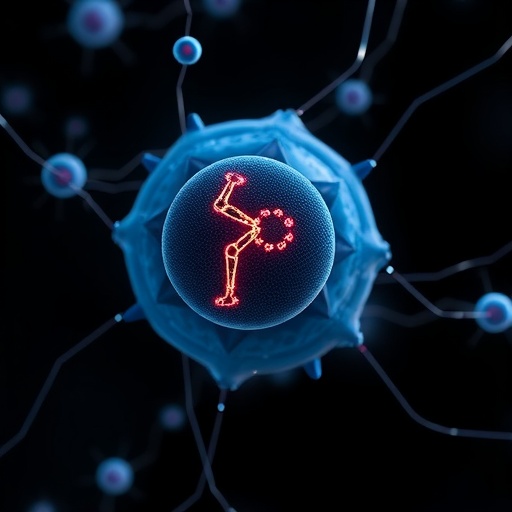Researchers at the University of California San Diego Sanford Stem Cell Institute have uncovered groundbreaking insights into the effects of space travel on human health, particularly concerning hematopoietic stem and progenitor cells (HSPCs), which are crucial for the formation of blood and the overall functioning of the immune system. Their findings, published in the esteemed journal Cell Stem Cell, represent a significant advancement in our understanding of cellular aging in extreme environments.
The research leverages state-of-the-art technology, including automated artificial intelligence-driven systems, to track stem cell activities in real-time aboard four SpaceX Commercial Resupply Services missions to the International Space Station (ISS). What the researchers have discovered is rather alarming: exposure to the rigors of spaceflight appears to accelerate the aging process in HSPCs. This hastened aging is characterized by a decline in the cells’ ability to produce healthy new cells, an increase in DNA damage, and a worrying acceleration of aging markers at the ends of chromosomes known as telomeres.
Dr. Catriona Jamieson, the director of the Sanford Stem Cell Institute, emphasizes the importance of these findings, stating that space serves as “the ultimate stress test for the human body.” She elaborates that the unique stressors encountered in space—specifically microgravity and cosmic radiation—lead to significant molecular changes in blood stem cells. This research is critical not just for the health and safety of astronauts on long-duration missions, but also offers valuable insights into aging and diseases like cancer on Earth.
Previous explorations by NASA suggested that spaceflight could impact immune function and telomere length. A prime example is the NASA Twins Study, which examined the effects of an extended space mission on astronaut Scott Kelly, while his twin brother, Mark Kelly, remained on Earth. Though many of the alterations observed during Scott’s time in space reverted after his return, some persistent changes were noted, including shorter telomeres and modified gene expression, both of which hold potential implications for future missions.
This recent study builds on the findings of the Twins Study and extends the knowledge in the field by meticulously focusing on HSPCs. The research team utilized a novel “nanobioreactor” platform, which consists of miniaturized biosensing systems designed for culturing human stem cells in the vacuum of space, thus allowing continuous monitoring of these cells using advanced imaging technology powered by artificial intelligence.
The researchers identified several hallmark features of aging in HSPCs exposed to the harsh conditions of orbit. Notably, these cells exhibited heightened activity levels, depleting their reserves and losing the ability to rest and recover—both critical capabilities for effective stem cell regeneration over time. This overactivity, coupled with elevated signs of molecular wear-and-tear, clearly maps out the stark similarities between the cellular effects of aging on Earth and those triggered by spaceflight.
In addition to the decline in the ability to produce healthful new cells, the study also highlights increased instances of cellular inflammation and mitochondrial stress. Mitochondria, the energy powerhouses of the cell, showcased responsive traumatization, central to overall cellular health and functionality. This multifaceted stress response could potentially compromise immune functioning and elevate the risk for age-related diseases, more so when one considers the extended exposure to space.
Intriguingly, the researchers also observed that, when these space-exposed HSPCs were later placed back into a healthy and youthful environment, some signs of damage began to reverse. This suggests the potential for rejuvenation of aging cells through environmental changes or specific interventions, opening new avenues for therapeutic techniques that could be applied both in space and on Earth.
These revelations are not limited to astronaut health; they serve as a critical framework for unlocking the mysteries of aging and related diseases. They reinforce the urgent need for methods to shield stem cells from the detrimental effects of prolonged space exposure while also enhancing our understanding of stress-induced aging which could translate into improved healthcare strategies on Earth.
In a statement, Twyman Clements, president and co-founder of Space Tango, expressed enthusiasm for the study’s publication, recognizing it as a culmination of collaborative efforts across various institutions, including Space Tango and the Integrated Space Stem Cell Orbital Research Center. The work signifies not only a breakthrough in aerospace medicine, but also paves the way for future advancements in both space-based and terrestrial scientific inquiries.
Planning ahead, the research team is eager to extend this study through more ISS missions and astronaut-based examinations, with a strong focus on real-time observations of molecular alterations and exploring potential pharmaceutical or genetic countermeasures that may safeguard human health, whether in orbit or on the Earth.
This pioneering work is part of a larger movement towards understanding the implications of space research on life both beyond and within our planet. As more commercial missions are set to launch, the intersection of space research and human health will likely yield transformative insights that could revolutionize our understanding of the human body and its biological processes, offering new strategies to deal with aging and its associated afflictions.
In conclusion, the findings from this landmark study underline the intricate connection between space exploration and fundamental biological mechanisms. The implications for future space missions, as well as advancements in medical science on Earth, highlight not just the challenges of human physiology in space but also the promise of new knowledge that arises from venturing into the cosmos.
Subject of Research: Aging of Hematopoietic Stem and Progenitor Cells in Space
Article Title: Spaceflight Accelerates Aging in Human Stem Cells, UC San Diego Study Finds
News Publication Date: October 2023
Web References: UC San Diego Health Sciences
References: Cell Stem Cell Journal
Image Credits: UC San Diego Health Sciences
Keywords
Spaceflight, Hematopoietic Stem Cells, Aging, DNA Damage, Microgravity, Telomeres, Immune Function, NASA Twins Study, Nanobioreactor, Artificial Intelligence, Space Research, Cellular Stress




